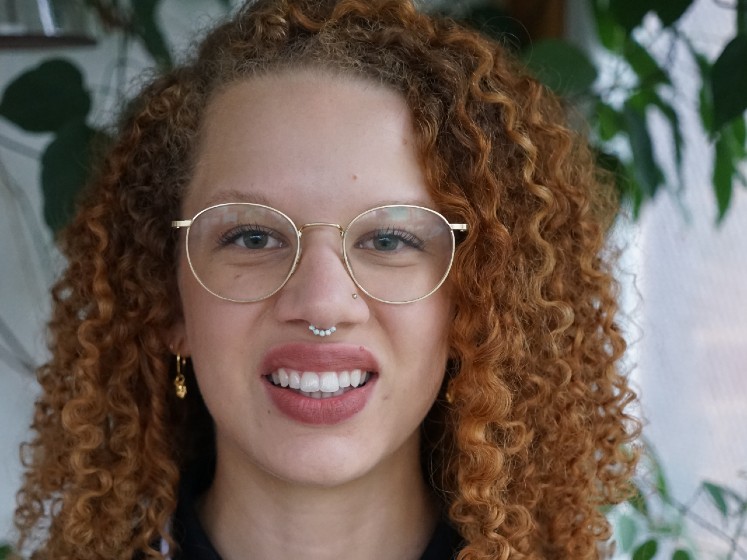 Alanah Mortlock
Alanah Mortlock
What are you currently researching?
My PhD project is an analysis of contemporary debates surrounding the concept of “transracialism”. This came to mainstream attention following the Rachel Dolezal scandal (an activist who identified as Black despite having been born to white parents).
I conceptualise the project as a work of Black feminist theory, and heavily implicated with and indebted to Black trans theory. Fitting to this tradition, my research is interdisciplinary and draws on genealogies of work embedded in gender theory, cultural studies, philosophy, history, and sociology, amongst others.
It’s important to me to understand my work as an anti-racist pursuit, structured by its politics that seek to reveal and challenge traces of anti-Blackness.
Why did you choose this area of study?
When the Dolezal scandal happened in 2015, I remember being so angry – like, getting involved in Facebook arguments with strangers angry. I got stuck in my desire to find ways of reasoning that could explain why Rachel Dolezal was not Black, and why comparisons between transgender and “transracial” identities were not valid.
When I started my project, I intended to pursue those questions, but the work I read around the topic, particularly that of Black trans theorists, encouraged me to take a different tack. Much of this work calls instead for a new mode of engagement that interrogates the politics, implications, and effects of discourses of transracialism in relation to the theorising of Blackness.
How will your research improve or have a wider impact on society?
For me, as for many people working on conceptual projects in the humanities and social sciences, this is a difficult question to answer. There are no clear ties to industry, or to policy, the sorts of things that generally populate indices of “impact”.
When I was a master’s student, there was a poster on the Gender Institute’s wall that read “THEORY SAVES LIVES”. I don’t think my work will save anyone’s life, but I think about all the ways in which theory has touched my life – given me new ways to think, helped me understand myself and the world, changed how I inhabit that world – and I hope my work can have that impact on someone else.
What do you hope to do career-wise, long term?
I want to stay in academia. Honestly, it’s a little daunting now: the path of an early career researcher is not an easy one to tread, and even those who find a foothold have an uphill climb ahead of them. I really love what I do though, what we do as feminist academics. I passionately believe in the importance of both research and teaching, and I hope to spend my career committed to them.
Can you provide any advice to prospective students about the most effective way to approach research and keep stress levels down?
During my first year, one of the hardest things was my expectation that I would be able to sit at a desk 9:00-5:00, Monday to Friday and produce. I don’t think this kind of work “works” like that, at least not for most people I know. So, try to be forgiving with yourself. Give yourself leeway so you can take time off when you’re not feeling productive. Take care of your mental, emotional, and physical health, allow yourself hobbies and interests – an identity – outside your research.
Also, if possible, share with those around you, whether that’s in your department, in reading groups, other friends on similar journeys. Share reading recommendations, interesting events, calls for papers. Share your feelings, your challenges, your successes. Share your work at any stage and be open to feedback. Research can be extremely isolating and sharing with people who are doing something similar can be a lifeline.
What resources are available at LSE to help young researchers and how has this helped you?
There are so many – from skills workshops to wellbeing support to funding – but the one I have to shout-out is the department librarians and especially ours, Heather Dawson.
Apart from being the quickest replier to emails of anyone I have regular contact with at LSE, Heather is a font of knowledge for all things related to accessing sources. For any new PhD student, I would strongly recommend organising a meeting with the librarian attached to your department and introducing yourself and your work.
In a few words, what is the best thing about studying at LSE?
My department. It really feels like we’re our own little community of like-minds within the wider LSE community.